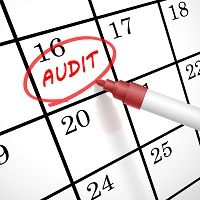Are You Part of the 1% (Facing an Audit)?
The word "audit" strikes fear in the hearts of every taxpayer, whether they file their taxes on their own using software or hire the industry's best bookkeepers and accountants.

The number one villain in crime television is the serial killer. If there was ever a CSI: Financial Crimes, the most common villain would be the IRS audit. In reality, the audit is slightly more common than the serial killer, but not by much: for those who aren’t super-rich, you have less than a 1% chance of getting selected for an audit.
Still, what if you didn’t know about all those red flags and were one of the unlucky ones? What do you need to know about an audit? Over two parts, we’ll cover what you need to know and what you may need to do. Even if you never face an audit, this information can help give you some peace of mind.
First Things First: Confirm
Make sure you’re really being audited by the actual, official Internal Revenue Service. Scammers these days will make phishing calls or send e-mails pretending to be the IRS and asking for personal information or payment. The IRS does not contact an individual via e-mail for an initial appointment. Rather, they will call you or mail you. If you do get a call, ask for an official title of the person calling and a call-back number. Never give personal information over the phone.
Ok, It’s the Real Thing. Now What?
First of all, don’t panic. There’s a chance the reason your return was flagged for an audit was a simple filing mistake, many of which can be easily resolved. Dentists, in particular, can sometimes be flagged if there is a big discrepancy year over year in your business or personal income.
There are three different types of audits:
• Correspondence Audits: The simplest and most common type of audit, usually resulting from a tax return error. If you have one of these, the IRS will specify a deadline for mailing in your updated records. Meet that deadline.
• Office Audits:
More complicated than a correspondence audit, and often filled with more anxiety, this type requires you to go into an IRS office with all paperwork applicable to your return. You’ll have to schedule a time to meet, usually within a few weeks, but you can request a postponement to get your records together.
• Field Audits:
Similar to the office audit, but in this case the IRS comes to your home or dental office, asking to see your records. Now you’re really sweating, perhaps. Don’t. Not yet, anyway.
No matter the type of audit, you’ll need to get our paperwork in order, which should include all tax forms received that year, prior year’s returns (which you may need to reference), copies of bank statements for the year, pay stubs or other proof of income, and any documents you may have that show your level of tax-deductible expenses.
In Part 2, we’ll look at some do’s and don’ts, including a key question: Should you hire an attorney or tax professional?